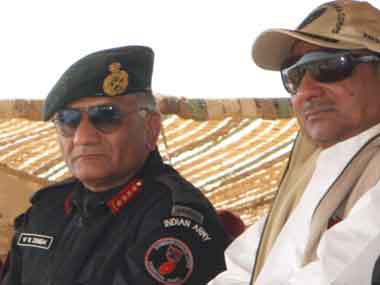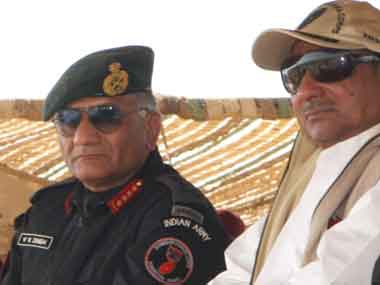An SMS joke doing the rounds goes something like this. “In India, the government decides the age (of retirement) of the army chief; in Pakistan, the army decides the age of the government.” This joke is the only reason anyone can have to smile about the ongoing embarrassment the country is facing over the government’s ham-handed handling of army chief Gen VK Singh’s date of birth. Gen Singh says it is 10 May 1951, and the government has decreed it is a year earlier
(For full details, read this)
. On the face of it, the whole controversy seems to be about whether Gen Singh should get an additional year as army chief or not. However, many other issues are involved, and the Supreme Court, where General Singh has filed his petition against the government’s decision on his age, will have to take a final call on it. [caption id=“attachment_187659” align=“alignleft” width=“380” caption=“Fighting each other. Image courtesy PIB”]
 [/caption] But whatever the court decides, everyone will lose from it. Consider the following ifs… If the court finds that General Singh is right, the government’s credibility will be seriously damaged for it has staked its prestige on the age issue. If the government’s stand is held to be correct, something even more fundamental will be lost: the sanctity of the matriculation certificate as proof of age will always be in question. Apart from the birth certificate, the matriculation certificate as proof of age is accepted in almost all organisations and for all purposes, including the issue of passports. This certificate is the basis of General Singh’s age claim, and thus cannot be easily set aside. If the government loses and still decides to remove Singh using its executive powers, it will damage the army’s morale. No previous army general has ever been removed by a civilian government, especially for a trivial reason like age-proof. If the government does not remove a recalcitrant general after losing a court battle, it will dent people’s faith in the supremacy of civilian control of the army. If General Singh wins, but chooses to remain in office till next year, the relationship between government and the army will be damaged for another year. If the government wins, and retains the General till 10 May this year, we will have three or more months of a bad relationship souring government-army ties. If the government chooses to remove General Singh and replace him with General Bikram Singh, the latter will start his tenure with the taint that he was beholden to politicians for his elevation. His moral authority with the army will fall in proportion. If General Singh is removed, given his role against corrupt elements in the army, the public will assume that he was inconvenient to people who wanted to hide their corrupt practices. If the Supreme Court decides on a third option – like sending the case back to the government for reconsideration or asking a group of bureaucrats to find out the real status of the general’s birthdate and army records - we are back to square one. If the Supreme Court, no matter what it decides, castigates the army for failing to reconcile the difference in birth dates recorded by the Military Secretary’s branch (which had the 1950 date) and the Adjutant General’s branch (which had the later date), the army may have a huge jobs reconciling all its current records on every person employed by it. Who knows how many such divergences exist? Why should a jawan not get the same benefit as a general? Clearly, there will be no winners in this war over the general’s age. In the circumstances, the best solution is still a compromise between the general and the government. The second-best option is for the general to resign and fight his battle for honour as a private person.
[/caption] But whatever the court decides, everyone will lose from it. Consider the following ifs… If the court finds that General Singh is right, the government’s credibility will be seriously damaged for it has staked its prestige on the age issue. If the government’s stand is held to be correct, something even more fundamental will be lost: the sanctity of the matriculation certificate as proof of age will always be in question. Apart from the birth certificate, the matriculation certificate as proof of age is accepted in almost all organisations and for all purposes, including the issue of passports. This certificate is the basis of General Singh’s age claim, and thus cannot be easily set aside. If the government loses and still decides to remove Singh using its executive powers, it will damage the army’s morale. No previous army general has ever been removed by a civilian government, especially for a trivial reason like age-proof. If the government does not remove a recalcitrant general after losing a court battle, it will dent people’s faith in the supremacy of civilian control of the army. If General Singh wins, but chooses to remain in office till next year, the relationship between government and the army will be damaged for another year. If the government wins, and retains the General till 10 May this year, we will have three or more months of a bad relationship souring government-army ties. If the government chooses to remove General Singh and replace him with General Bikram Singh, the latter will start his tenure with the taint that he was beholden to politicians for his elevation. His moral authority with the army will fall in proportion. If General Singh is removed, given his role against corrupt elements in the army, the public will assume that he was inconvenient to people who wanted to hide their corrupt practices. If the Supreme Court decides on a third option – like sending the case back to the government for reconsideration or asking a group of bureaucrats to find out the real status of the general’s birthdate and army records - we are back to square one. If the Supreme Court, no matter what it decides, castigates the army for failing to reconcile the difference in birth dates recorded by the Military Secretary’s branch (which had the 1950 date) and the Adjutant General’s branch (which had the later date), the army may have a huge jobs reconciling all its current records on every person employed by it. Who knows how many such divergences exist? Why should a jawan not get the same benefit as a general? Clearly, there will be no winners in this war over the general’s age. In the circumstances, the best solution is still a compromise between the general and the government. The second-best option is for the general to resign and fight his battle for honour as a private person.
Govt vs General: Why there will be only losers in this war
R Jagannathan
• January 19, 2012, 15:14:10 IST
Even though the matter has reached the Supreme Court, the best course of action is still for the government and Gen VK Singh to reach a compromise.
Advertisement
)